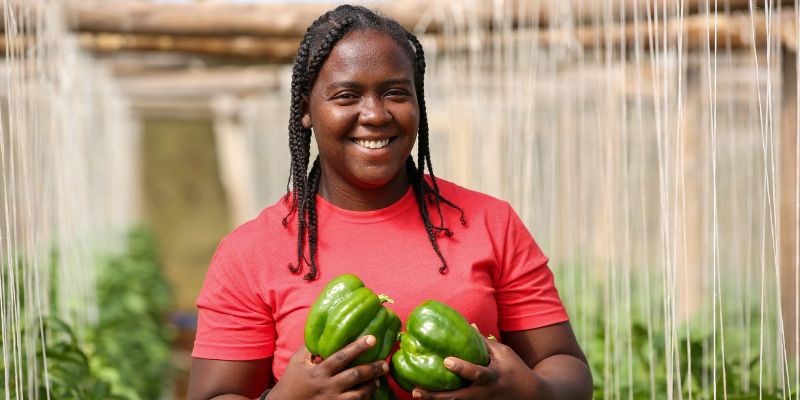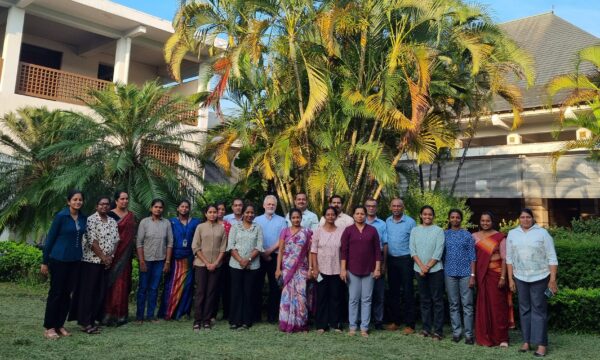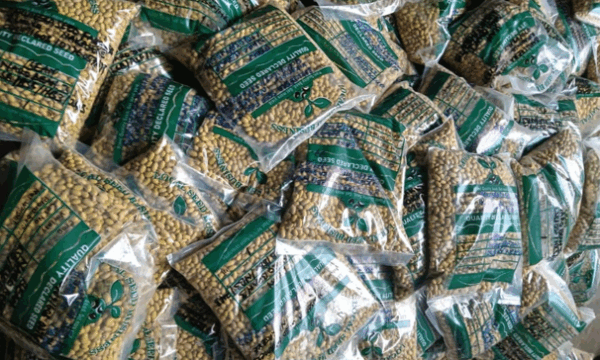“At first, I don’t think he wanted us in farming. He more wanted a nurse, or a flight attendant, or something like that.” Justine is a young farmer in Jamaica who initially faced resistance from her father. She and her siblings are now preparing to take over the family farm.

Ensuring Jamaica’s future food security
By 2050, the global population is expected to reach 9 billion. A new generation of farmers will need to be the future of food security. However, few young people see a future for themselves in agriculture.
In Jamaica, that story is changing.
This PlantwisePlus video sees how young people – farmers, advisors, educators – bring passion and innovation to agriculture in Jamaica.
Supporting young people in agriculture is part of Jamaica’s national food security strategy. It wants to make agriculture an attractive career for its youth. It’s working.
Alongside Jamaica’s Rural Agricultural Development Authority (RADA), PlantwisePlus provides plant doctor training to the country’s extension officers. Through this training, they can better support farmers with actionable advice on how to prevent crop losses. The Plantwise programme began in Jamaica in 2015. It is now implemented by RADA, who help deliver the plant doctor training.
The Government of Jamaica has institutionalized the Plantwise programme and shown strong ownership of its interventions. RADA includes Plantwise in its plans and priority programmes.
Reaching beyond Jamaica’s extension services
The plant doctor training is also taught at universities like the College of Agriculture, Science & Education (CASE). This means it is not only equipping future extension officers, but other young people working throughout the plant health system – in research and the private sector.
“We want the young people to understand the importance of farming. It’s not just about going out there to get your hands dirty. It’s about ensuring food security [and] sustainability. Seeing the bigger picture,” says Sherry-Ann Brown, a lecturer at CASE.

In 2019, RADA approached CASE to introduce the Plantwise programme; sharing how it could bring significant advantages to both students and the wider Jamaican community. This marked the beginning of an ongoing collaboration between RADA and CASE that focuses on two key objectives.
Firstly, to enhance linkages among CASE’s educational services, RADA’s extension programs, and the initiatives of the Research and Development Division (R&DD). This aims to pool skills and share resources, creating a more integrated and effective approach to agricultural development in Jamaica.
Secondly, to better prepare newcomers to the agricultural sector for the workforce. This involves various capacity-building initiatives like workshops and training sessions to ensure that these new entrants were job-ready.
But the collaboration doesn’t stop there. This partnership is still unfolding. RADA and CASE are discussing future opportunities such as incorporating plant doctor training directly into CASE’s academic curriculum. Plus, they are looking at giving extra consideration to job applicants who have a plant doctor training certificate, particularly for roles that involve pest or pesticide management.
Young people bring technology and innovation
Sherry-Ann also notes that now, “a lot more young persons are interested in going into farming. And the good thing about that is that they are also bringing new technology. So, they are not so traditional in their approaches.”
With widespread use of mobile technology, farmers and their extension officers can stay in touch without having to meet in person.

“The plant doctor programme prepared me in a way that I can engage with the farmers not only through field visits, but also through the use of this cell phone. They shoot me a picture and I am able to make a diagnosis,” says extension officer Chantelle Holliday.
Justine also says that she and other farmers in her community are in a WhatsApp group with their parish’s extension officer. They can reach out for advice faster and also share that knowledge more widely with others.
“Their knowledge is the most valuable thing that they could offer us,” says Justine.
In addition, PlantwisePlus digital tools and resources support others in Jamaica’s plant health network. Plant doctors gather information from farmers and add it to the Plantwise Online Management System (POMS). Through this digital data collection, plant health actors can see what is happening on the ground and better predict and prevent pest outbreaks and diseases.
“We’re able to see individual trends in a particular area. We’re also able to see national trends and that can guide decision-making where plant health issues are concerned in Jamaica,” notes Sherry-Ann.
This supports Jamaica’s efforts to strengthen its sanitary and phytosanitary procedures at airports which can be a gateway for invasive species. As a small island nation, Jamaica has unique challenges when it comes to food security, including a high rate of imported goods.
The outlook for Jamaica’s youth in agriculture

Jamaica recognizes the need to equip and empower its young women and men as crucial for its future food security. Especially in the face of a changing climate and a growing population.
PlantwisePlus and partners are working to support the young people of today, so that they may become the next generation of farmers and agricultural specialists.
As Justine says, “the best part about farming to me is seeing our produce. Seeing the outcome. Seeing that our hard work really pays off in the end, you know?”
Learn more about CABI’s work in Jamaica:
Jamaica’s plant doctors shine in Plantwise programme awards
40th country Jamaica joins CABI BioProtection Portal
Rallying around plant health in Jamaica
Jamaica is a member country of CABI. In 2015, CABI’s Plantwise programme was successfully launched in the country. Plant clinics and plant doctors in 14 parishes are helping smallholder farmers diagnose and mitigate a range of plant health problems.
The implementation of the Plantwise programme in Jamaica began in 2015 through a partnership between the Ministry of Agriculture and Fisheries (MoAF) and CABI. The programme is being implemented by MoAF through its extension arm, the Rural Agricultural Development Authority (RADA). Activities such as data management and training are strongly supported by members from the Ministry’s Research & Development Division (R&DD) – Plant Quarantine Produce Inspection (PQPI) unit. There is also a National Steering Committee which provides oversight, coordination and guidance for the programme.
The video was developed in association with PlantwisePlus. All images are ©CABI.
Related News & Blogs
CABI Academy supports Vietnamese universities in training the next generation of plant health professionals
Plant health lies at the centre of food security and sustainable agriculture. In Vietnam, as in many countries, preparing the next generation of plant specialists with the latest knowledge and practical skills is essential to achieving this goal. Under…
7 July 2025




